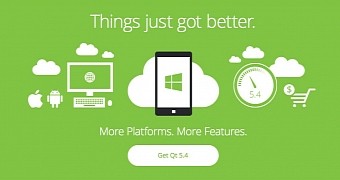Digia, trough Tuukka Turunen, was proud to announce the other day, February 24, the immediate availability of Qt 5.4.1, the first point release of Qt 5.4, alongside the announcement for Qt Creator 3.3.1. Qt 5.4.1 is a maintenance release that introduces a number of improvements and fixes several bugs discovered in the previous version of the product.
According to the release notes, Qt 5.4.1 can now be built on any Linux kernel-based operating system without the need of D-Bus, enabling QtDBus for all builds as well. Furthermore, Qt 5.4.1 updates the device creation reference stacks for both Linux and Android platforms, supports compiling of projects using embedded Linux toolchains, and adds support for the Windows 10 Technical Preview (TP) operating system.
“Qt 5.4.0 released in December introduced many features such as our new Chromium-based Qt WebEngine, WinRT support (including Windows Phone), and several Graphics improvements. With Qt 5.4.1 we are providing a good set of bug fixes and enhancements – thanks to all the feedback and reports we’ve received,” said Tuukka Turunen in the official announcement.
It brings back binary compatibility for Qt 5.3.2
Another interesting feature of Qt 5.4.1 is that it brings back binary compatibility for the entire Qt 5 series, especially Qt 5.3.2, on Microsoft Windows operating systems, which was broke in the Qt 5.4 release because of Microsoft Visual Studio (MSVC) 2012/2013.
Moreover, JIT (Just-in-time compilation) has been enabled by default in the Qt Quick Engine, the Mac OS X binaries have been fixed, several OpenGL critical fixes have been patched, and the WinRT (Windows Runtime) platform-homogeneous application architecture of the Microsoft Windows 8 operating system received numerous enhancements.
Download Qt 5.4.1 right now from Softpedia. In addition, you can also download Qt Creator 3.3.1, but keep in mind that the Qt 5.4.1 packages also include Qt Creator. The brand-new Qt 5.4.1 is now available in the Testing repositories of the Arch Linux operating system and will be released to users via the official channels in the upcoming days.

 14 DAY TRIAL //
14 DAY TRIAL //